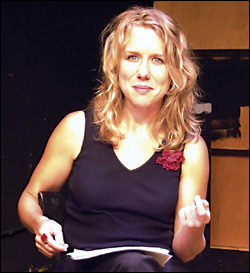Lauren Weedman will get to the joke about Lauren Weedman long before you ever do, no matter how much it hurts. To watch her in solo performance—hell, to watch her talking over a sandwich at lunchtime, as I am—is to witness an ace archer heading out for private target practice with a bull’s-eye on her chest. Weedman may have a better idea of when a punch line is coming at her own expense than even she realized: The wincing comic high point of Rash, her last piece, had a fed-up lover walking out on her for using his humiliation to get a laugh from casting agents; Weedman’s real-life husband left her the day after it opened.
“I made that part up,” she says, still a little dazed. “I sort of made it up as if to say, ‘Oh, God, he must be so sick of me sometimes.’ And all of a sudden it happened. And I remember thinking I manifested it.”
Wreckage, which opens this week at Theatre Babylon for a workshop directed by Jeff Weatherford (call 206-720-1942 for information), gives Weedman another chance to continue the comic exploration of her own doom—with an unflinching postdivorce self-appraisal as a springboard. And, yes, she knows how that makes her sound.
“I hate saying that because it sounds like such a joke,” she groans. “I say, ‘I’m doing this solo show,’ and people are like, ‘ . . . about your divorce? Ha, ha, ha!’ And I’m like, ‘Ha, ha, ha . . . um, maybe.'”
A lot of things haven’t been terribly funny for Weedman in the last couple of years. Her stay on Comedy Central’s The Daily Show With Jon Stewart came to an end when she and the host didn’t exactly click; then New York producers for Rash dropped her for hesitating at their suggestion that she rename the show Chub and make it about a fat girl who dates gay men. (“And they didn’t want any death anxiety in it,” she adds.)
Feeling low after riding very high, she relocated to Los Angeles, which, while helping her score work with VH1 and on Comedy Central’s Reno 911 this month, meant an even more necessary self-consciousness.
“It’s so funny—the conversations about looks,” she says, recalling L.A. auditions. “‘Oh, it’s not that you’re not attractive. You’re attractive. It’s just that . . . you know . . . ‘ And then you have to sit there going, ‘Oh, I know. I know I’m not. I’m lucky to be here.’ Because you want to be the first one to say it.”
She’ll also be the first to say how much she’s bought into it.
“There was a point last year where I was crying because I didn’t get The Jeff Foxworthy Show,” she groans. “The money thing is so blinding when you get down there. All the clichés are true.”
Weedman is fully aware that doing one-woman shows indicates an almost unseemly amount of self-absorption, and it’s her frustrated, obsessive contemplation of that self-absorption that makes her so achingly funny. She says a major turning point in Wreckage comes from a moment in her life when she told an outlandish lie at a public gathering just because “I didn’t like how the party was going. And then the party changed.”
“Over the years, when I came to terms with that lie, I sort of prided myself [on being] honest and open,” she continues. “[But] with my marriage, I really didn’t get why it would be over. I acted like I hadn’t done half the shit I had done, that I hadn’t treated him the way I had. Then while he was gone, I lived with my best friend from high school in L.A.—I dated him when I was younger, and he’s gay—and every time I would say, ‘I don’t understand why!’ he was, like, ‘You don’t understand why? Let’s review. . . . ‘”
Wreckage unloads that review of past sins, and is, she says, more personal than any of her other warts-and-all one-woman comedies.
“It’s the only one I’ve ever done in my life that really feels like a solo show,” she explains. “It’s me talking. I know it seems stupid to say ‘It seems so self-absorbed’ because, duh, I’ve already done it before. But it really does feel like ‘Wow—I think I’m interesting.’ Because I’m just used to making it more of a play.”
Life is pretty much a play for Weedman at this point; everything is fodder for a stage bow. She asks how I’m doing, taking a bite of sandwich while listening to my rambling, desultory response.
“That’s fascinating—do a show about it,” she deadpans. “But I would pump up the end. And I think for you: dance. Only because I got a little tired in the middle.”








